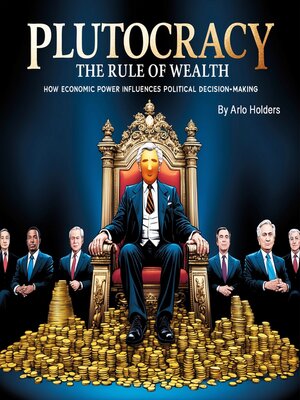Plutocracy
audiobook (Unabridged) ∣ The Rule of Wealth: How Economic Power Influences Political Decision-Making
By Arlo Holders

Sign up to save your library
With an OverDrive account, you can save your favorite libraries for at-a-glance information about availability. Find out more about OverDrive accounts.
Find this title in Libby, the library reading app by OverDrive.



Search for a digital library with this title
Title found at these libraries:
| Library Name | Distance |
|---|---|
| Loading... |
Plutocracy, often described as the rule of wealth, refers to a political system in which economic elites hold significant influence over government decisions, shaping policies to favor their interests. This concentration of power is not limited to authoritarian regimes or monarchies but can also be observed in modern democracies, where wealth and power are deeply intertwined. In such systems, political decisions are often made in ways that protect and increase the wealth of the rich, while the needs and concerns of the broader population are sidelined.
The concept of plutocracy is not a recent phenomenon. Throughout history, societies have been dominated by a small group of wealthy individuals or families who controlled vast resources and used their wealth to influence political outcomes. Whether through the control of land, natural resources, or capital, the wealthy elite have been able to dictate the direction of national policies, often at the expense of the lower classes. From the Roman Empire to the monarchies of Europe, political power and economic power have often been inextricably linked.
In modern democracies, the influence of wealth on politics is more subtle but no less pervasive. Campaign financing, lobbying, and the revolving door between government and corporate sectors are just a few examples of how wealth can shape political agendas. Political campaigns are expensive, and politicians often rely on wealthy donors and interest groups to fund their campaigns. In return, these donors and groups expect favorable legislation or regulatory policies. As a result, the political system becomes more responsive to the needs of the wealthy, while the voices of ordinary citizens are drowned out.







